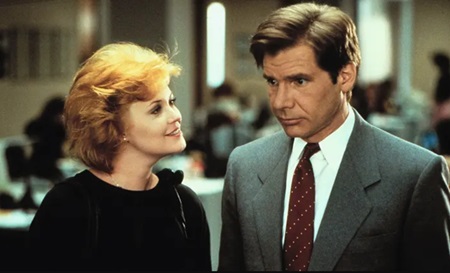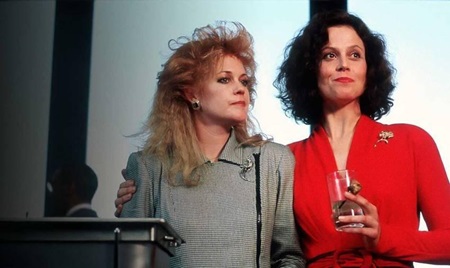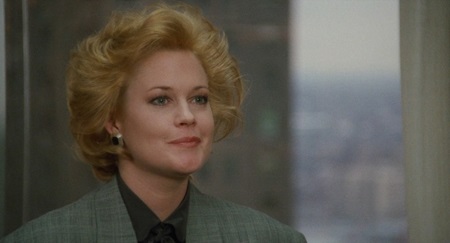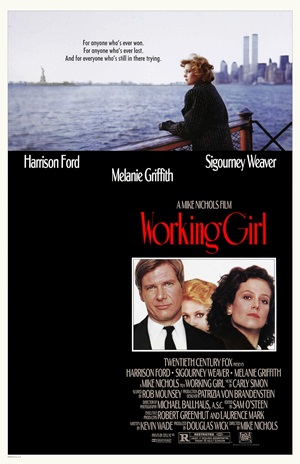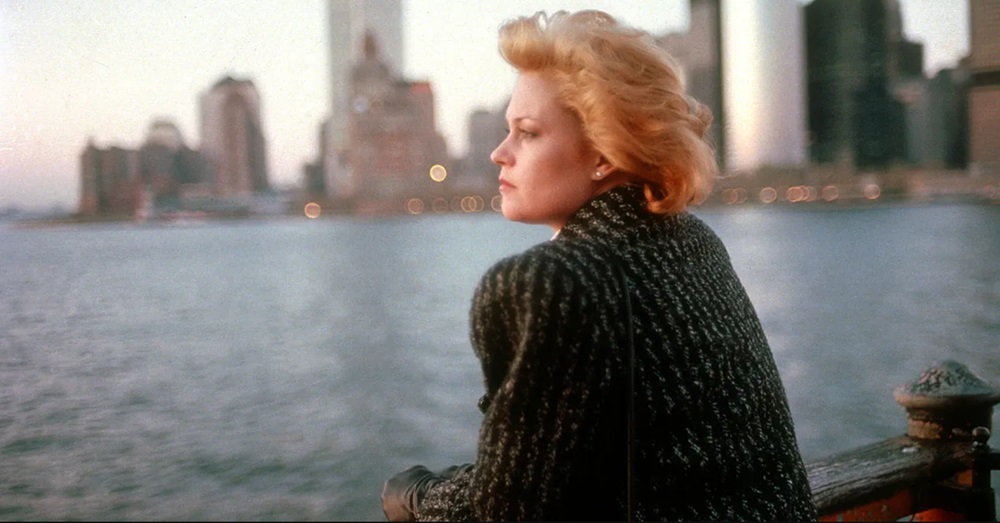
Unforgettables: Cinematic Milestones #24 – Working Girl (1988)
by Sara Michelle Fetters - January 24th, 2024 - Features
Working Girl: Still channeling my inner Tess McGill on the classic romcom’s 35th anniversary
NOTE: This feature originally appeared in the December 15, 2023 edition of the Seattle Gay News.
When I was first coming out as Trans, I went to a support group at Seattle’s Ingersoll Gender Center. One of the other attendees asked me if I was “channeling my inner Tess McGill.” She meant it as a compliment, and I unquestionably took it as one. As portrayed by Melanie Griffith in director Mike Nichols’s Academy Award–winning 1988 rom-com Working Girl, Tess was something of an early spirit animal for me, her entire transformation one I secretly dreamt about and aspired to for well over a decade.
I don’t know how many times I watched it when I was in high school, but I do know it was enough that could quote several lines at the drop of a hat. I had the poster for its VHS release on my bedroom wall. Heck, as a senior, I coerced my cheerleader girlfriend at the time to style a wig similar to Tess’s secretarial look when I “lost” a bet with her and had to wear her uniform for Halloween (yes, I lost that bet on purpose — big surprise, I know).
Suffice it to say, this is one film that means a whole lot to me.
It helps that Working Girl is also pretty dang great outside of my transformational personal connection. One of a glut of Wall Street business comedies, dramas, and romances during the 1980s, it stands far out from the crowd for a multitude of reasons. Kevin Wade’s screenplay is nimbly inventive and Nichols directs with confident flair, trusting the material and allowing the talented ensemble to make their collective mark without too much unnecessary influence on his part.
Speaking of that cast — holy cow, is it a doozy! Griffith, Sigourney Weaver, and Joan Cusack were all nominated for Oscars. Harrison Ford, communing with his inner Cary Grant — sexy as hell, and unafraid to play the foppish fool when required — should have gotten a nomination as well. Alec Baldwin, Nora Dunn, Philip Bosco, Oliver Platt, Olympia Dukakis, Ricki Lake, and a blink-and-you’ll-miss-him David Duchovny all make early appearances, while Kevin Spacey kills it in a brief scene as a smarmy sexual predator in a performance that was far more on the nose than anyone at the time could have realized.
The plot is pure 1930s-style, old Hollywood hokum, only with a decidedly R-rated Reagan-era spin. New Jersey everywoman Tess McGill dreams of getting out of the Wall Street secretarial pool and becoming a high-powered executive. When she goes to work for firebrand Katharine Parker (Weaver), it looks like that fantasy might become a reality. But when her boss steals one of her ideas and tries to pass it off as her own, Tess turns the tables on her, impersonating Katharine when she’s injured in a skiing accident out of state.
Ford is Jack Trainer, a former high-flying marketing and advertising wiz who’s currently down on his luck, whom Tess teams with to close a major deal with multimillionaire players. Cusack is her kooky best friend and confidant Cyn. As for Baldwin, he’s Tess’s boyfriend Mick, a fan of skimpy underwear, getting his charter boat business off the ground, and — for better and for worse — a mutual acquaintance from the neighborhood, Doreen DiMucci.
Precious little happens that is unexpected. One could easily see the aforementioned Grant or Clark Gable stepping in for Ford, Joan Crawford or Bette Davis slipping on Weaver’s shoes, and Jean Harlow or Claudette Colbert undergoing a transformation similar to Griffith’s. But Nichols’s direction is cleverly astute and observationally lithe. He treats every key character with respect, and while he may show disdain or even go so far as to ridicule their actions, he never attacks any of them personally. He melds old storytelling conceits and modern sensibilities with pinpoint precision, giving Working Girl a complex edge that fits its era perfectly.
As a fan and a critic, there’s plenty to adore. The romance between Tess and Jack happens with seductively charming subtlety. Ford and Griffith’s fiery chemistry is instantaneous, from the moment of their tequila and bod-for-sin meet-cute to their lunchbox-have-a-nice-day-at-work-dear morning canoodle. Weaver is a far more complex villain than it initially appears, while Cusack steals scenes left and right with her “coffee, tea, or me?” cocksure goofiness.
But there’s so much more than that. Whether intentional or not, Wade composed a story of metamorphosis and rebirth that transcends gender stereotypes. It was eerie how so many of my own internal struggles with who I longed to be were reflected in what Tess was going through. I loved how, even when she began to change up her wardrobe, tone down her makeup, and do something new with her hair, she still refused to fit the male stereotype of what a female in the corporate executive suite was supposed to look like. Tess maintained her femininity, and for the 1980s, presenting that with such celebratory gusto was no small thing.
With each passing year, my connection to Working Girl increases. I see new things in it that I never did before, like how, even with the nudity, director of photography Michael Ballhaus refuses to resort to exploitive sensationalism whenever his camera focuses in on Griffith’s body. We talk a lot about the “male gaze” and the “female gaze” in motion pictures, but it’s clear Nichols was ahead of the curve. If this wasn’t apparent with The Graduate or Carnal Knowledge, it certainly became so here. The human body is celebrated no matter whose it is, and if anything, it is Ford and Baldwin who are visually ogled, not the naturalistically scantily clad Griffith.
I’ve also become far more forgiving of Katharine than I was as a teenager. She’s still up to no good, and the connivingly self-centered way she uses Tess to get ahead is irredeemably appalling. But Weaver deftly shows hints of the male-dominated worldview that transformed her into what she has become. Katharine is doing exactly what she believes every man in her office would be celebrated for accomplishing, and she’s so brainwashed by the patriarchal hierarchy that she can’t comprehend why others view her actions as reprehensible.
Happy to say, I still channel my inner Tess McGill. Not so much her look anymore, although I think I could still rock that flowing blonde bob teased to within an inch of its life if given the opportunity. No, I like to think I emulate Tess’s tenacity and her drive to accomplish the impossible. I do my best to see each morning as an opportunity to accomplish something great.
Carly Simon’s Academy Award–winning theme song, “Let the River Run,” says it best, I think. I still feel myself coming to the edge and running on that water, and even as the metaphorical fog swirls thickly around me, I know that silver cities will continue to rise in the distance, and my dreams are just as vital now — and just as capable of waking up a proverbial nation — as they were when I was a wide-eyed freshman in high school.
Celebrating its 35th anniversary, Working Girl is available to purchase digitally on multiple platforms. It is not currently streaming or available on DVD or Blu-ray.
